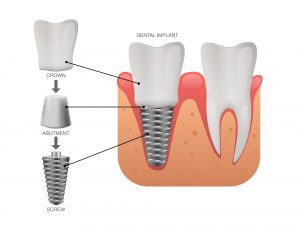 Are dental implants painful? It’s a question that lingers in the minds of many considering this popular tooth replacement option.
Are dental implants painful? It’s a question that lingers in the minds of many considering this popular tooth replacement option.
While some discomfort during and after the procedure is normal, advancements in technology and techniques have significantly minimised pain levels. In fact, most patients report only mild to moderate discomfort that can be managed effectively with over-the-counter pain relievers.
It’s important to note that individual experiences with dental procedures, such as the implant procedure, may vary depending on factors such as bone grafting, abutment placement, and overall oral health.
During your initial consultation with a dental professional, they will assess your specific situation and discuss any concerns you may have regarding pain.
Don’t let fear of pain deter you from exploring the benefits of dental implants. With proper care and guidance from your dentist, any discomfort experienced during treatment will be temporary and far outweighed by the long-term advantages of a restored smile for the patient.
So let’s delve into the world of dental implants and debunk some myths about them!
Understanding Dental Implant Surgery: What to Expect
Dental implant surgery, performed by an oral surgeon, is a treatment that involves placing titanium posts into the jawbone to support artificial teeth. This innovative solution has become increasingly popular for patients looking to restore their smiles and regain full functionality of their mouth. If you’re considering dental implant surgery, it’s natural to wonder about the level of pain involved in the process.
To ensure patient comfort during dental procedures, a dental professional typically administers local anaesthesia. This helps minimise any discomfort or pain that may arise during the implant treatment itself. The dental professional will carefully place the titanium posts into the jawbone, creating a strong foundation for the implant crown.
Once the oral surgeon completes the dental implant surgery, patients should expect some swelling and minor discomfort in the days following. This is a normal part of the healing process as your jaw and bone density adjust to the presence of implants. Over-the-counter pain medication can be used to manage any post-surgical discomfort.
Understanding what happens during dental implant surgery can help patients mentally and physically prepare for this transformative procedure. By knowing what to expect from an oral surgeon, you can approach your dental implant journey with confidence. This includes understanding the pain relief options available and being aware of how the jaw may be affected. It is also important to communicate your pain level to your oral surgeon throughout the process.
 During dental implant surgery, your surgeon will follow a series of steps to provide jaw pain relief and assess your pain level.
During dental implant surgery, your surgeon will follow a series of steps to provide jaw pain relief and assess your pain level.
- Initial consultation: Before scheduling your implant procedure, an initial consultation will take place where your dentist will evaluate your oral health and determine if you are a suitable candidate for dental implants.
- Preparation: On the day of surgery, you’ll receive local anaesthesia to numb the area being treated. This ensures that you won’t feel any pain during the procedure while remaining awake and aware.
- Implant placement: Your surgeon will make an incision in your gum tissue to expose the underlying jawbone. Then, small holes are drilled into specific locations within the bone where each titanium post will be placed.
- Healing period: After placing the implants, there is a healing period of several months. During this time, the jawbone fuses with the implants in a process called osseointegration, creating a stable foundation for your artificial teeth.
- Abutment placement: Once the implants have fully integrated with the jawbone, an abutment is attached to each implant. The abutment acts as a connector between the implant and the artificial tooth or crown.
- Final restoration: After allowing some time for healing and gum tissue growth around the abutments, your dentist will create and attach your custom-made artificial teeth or crowns on the abutments.
By following these steps, dental implant surgery provides a long-lasting solution that closely mimics natural teeth in terms of appearance and functionality.
Duration of Discomfort and Pain after Dental Implants
Discomfort after dental implant surgery is a common concern for many patients. It’s natural to wonder how long the pain will last and what can be done to manage it effectively. Let’s explore the duration of discomfort and pain after dental implants, as well as some tips for a smoother recovery.
- Discomfort after dental implant surgery usually lasts for a few days to a week, varying from person to person.
The duration of discomfort experienced after dental implant surgery can vary depending on several factors, including the individual’s pain tolerance, the complexity of the procedure, and their overall health. In general, most patients can expect some level of discomfort for a few days up to a week following the surgery.
- Most patients undergoing dental implant treatment experience manageable pain that can be controlled with prescribed or over-the-counter medications. The pain is typically associated with the implant post.
While discomfort is expected during the recovery period, it is important to note that most patients find the pain to be manageable. Your dentist may prescribe pain medication or recommend over-the-counter options such as ibuprofen or acetaminophen to help alleviate any postoperative pain.
- As the implant post healing progresses, any residual discomfort gradually subsides, allowing patients to resume normal activities.

As your body heals and adjusts to the presence of dental implants, you will likely notice that any residual discomfort gradually diminishes over time. This improvement in comfort typically allows patients to resume their normal daily activities without significant hindrance.
To ensure optimal comfort during your recovery period, it is crucial that you follow all post-operative care instructions provided by your dentist or oral surgeon.
These instructions may include:
- Taking prescribed medications as directed
- Applying ice packs on your face near the surgical area
- Eating soft foods and avoiding hard or chewy foods
- Avoiding strenuous physical activity
- Maintaining good oral hygiene through gentle brushing and rinsing
By adhering to these guidelines, you can help minimise discomfort and promote a smoother healing process.
Factors Affecting Pain Levels in Dental Implant Procedures
Individual pain tolerance varies, influencing how each patient perceives discomfort during and after dental implant procedures. While some individuals may experience minimal pain or discomfort, others may find the process more challenging. Several factors contribute to the level of pain experienced during and after dental implant surgery.
The complexity of the case plays a significant role in determining post-surgical pain levels. Factors such as bone quality or quantity can impact the level of discomfort experienced by patients. In cases where there is insufficient bone to support the implant, additional procedures like bone grafting may be required. These procedures can lead to increased swelling and tenderness, resulting in higher levels of postoperative pain.
Proper placement techniques by skilled dentists contribute to minimising potential pain during and after dental implant surgery. Precise positioning of the implant ensures that it integrates well with the surrounding tissues, reducing the risk of complications or discomfort. Dentists who are experienced in performing dental implant procedures are adept at using techniques that minimise trauma to the surrounding tissues, resulting in a smoother recovery process for patients.
Pre-existing oral health conditions can also affect healing time and potentially increase discomfort levels in some cases. Patients with underlying gum disease or infections may experience more pain due to compromised oral health. In these situations, dentists may need to address these issues before proceeding with dental implant surgery to ensure optimal healing and reduce postoperative discomfort.
Dental implant procedures are often a source of anxiety for many individuals, primarily due to concerns about pain and discomfort. However, it is important to debunk the myth surrounding dental implants and understand that they are not as painful as commonly believed.
It’s crucial to consider the long-term benefits when evaluating any temporary discomfort associated with dental implants. Unlike other tooth replacement options like dentures or bridges, dental implants offer a permanent solution that closely mimics natural teeth in terms of both functionality and aesthetics. With proper care, dental implants can last a lifetime, providing improved oral health and restoring confidence in one’s smile.
Exploring Post-Surgical Pain: Throbbing and Recovery Tips
 To summarise:
To summarise:
- Throbbing sensations after dental implant surgery are normal and part of the healing process.
- Over-the-counter pain relievers recommended by your dentist can effectively manage throbbing or pulsating pain.
- Following proper oral hygiene practices, including gentle brushing and rinsing with prescribed mouthwash, aids in recovery and minimises discomfort.
- Applying an ice pack wrapped in a cloth on the cheek near the surgical site can help reduce swelling and alleviate throbbing sensations.
- Avoiding strenuous activities that could disrupt healing helps reduce throbbing sensations after dental implant surgery.
By following these recovery tips and seeking guidance from your dentist when needed, you can ensure a smoother healing process and minimise any post-surgical pain associated with dental implants. Remember to be patient as the discomfort will gradually subside, allowing you to enjoy the benefits of your new dental implant.
Conclusion: Dispelling the Fear of Dental Implant Pain
Dental implant surgery may cause some discomfort and pain, but it is generally manageable and temporary. Understanding what to expect during the procedure, the duration of discomfort afterward, and the factors that can affect pain levels will help alleviate any fears or concerns you may have.
During dental implant surgery, you can expect your dentist or oral surgeon to numb the area with local anaesthesia to minimise any potential pain. While some soreness and swelling are common after the procedure, these symptoms typically subside within a week or two.
Various factors can influence the level of pain experienced during dental implant procedures. These include individual pain tolerance, complexity of the case, and proper post-operative care. By following your dentist’s instructions for managing pain during recovery, such as taking prescribed medications and maintaining good oral hygiene practices, you can ensure a smoother healing process.
It is important to debunk the myth that dental implants are inherently painful. While everyone’s experience may vary slightly, most patients report minimal discomfort throughout their dental implant journey. The long-term benefits of having a functional and natural-looking tooth replacement far outweigh any short-term discomfort.
If you do experience post-surgical pain after getting dental implants, it is often described as throbbing or dull aching. This is normal during the initial stages of healing but should gradually diminish over time. To aid in recovery and reduce discomfort further, consider implementing tips such as applying ice packs to reduce swelling or sticking to soft foods until soreness subsides.
While there may be some temporary discomfort associated with dental implant surgery, it is crucial not to let fear deter you from pursuing this effective tooth replacement option. By understanding what to expect before and after the procedure and following proper post-operative care guidelines provided by your dentist or oral surgeon, you can minimise any potential pain and achieve a healthy smile that lasts.


